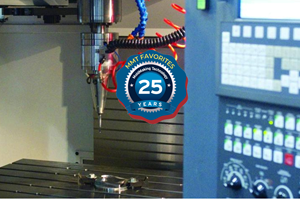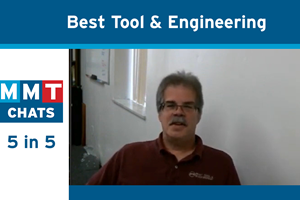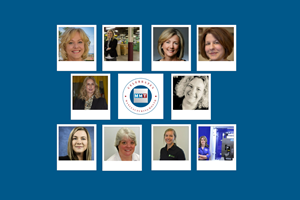Canon Virginia, Inc.: From Captivity to the Open Market
This world-renown imaging company proves its worth in the moldmaking market by adding value to the process with turnkey operations.
When one hears the name Canon cameras and copiers immediately come to mind. However, the company also has stepped into the world of moldmaking—Canon Virginia, Inc. (Newport News) started producing molds in the United States three years ago and has quickly grown into a shop on the cutting edge with technology and equipment. Once the decision was made to begin producing molds here it only took 18 months for the company to develop and approve plans, build the toolroom, purchase and install equipment and hire employees! Within that 18-month period, Canon Virginia was producing molds for in-house use.
Canon Virginia currently employs 1,200 people and has used proprietary technology like its design and programming software that was developed in Canon Inc. (located in Japan) and recently decided to build plastic injection molds for outside customers in the consumer electronics, outdoor power equipment and packaging closures industries. The company offers turnkey operations—mold design and build, sampling the mold, and full assembly.
Worldwide Operations
Canon Virginia, Inc. is a subsidiary of Canon Inc. and Canon U.S.A. (located in New York). Canon Virginia was incorporated in 1985 as an assembly plant for Canon copiers. For the next 18 years, the facility developed core competencies in all aspects of manufacturing—including quality, procurement, engineering and logistics. Then, five years ago, the facility was transformed from an assembly plant for office products into Canon’s Manufacturing Center for the Americas. Currently the company offers assembly, molds and reverse logistics services—which involved bringing products (e.g. printers or cell phones) back in from the market for remanufacture or refurbishment for resell, or disposal.
“Canon has been manufacturing products in Virginia for more than 20 years,” notes Canon Virginia Business Development Manager Matt Slothower. “Globally, Canon has been making molds for more than 40 years and is a leader known for its outstanding products and commitment to quality. In toolmaking alone, we have invested $6 million in the past two years in state-of-the art equipment and software from the likes of Makino, Okamoto, Mitsubishi and Mori Seiki to meet customer requirements.”
Research and Development
In addition to the molds it produces, Canon’s proprietary software rapidly converts product design into machine code—helping the company to automate the process of designing a mold so the designer can spend more time on how to tool the part versus working on detailed portions of the design such as the detailed design of a slide, for example. “This seamless flow enables us to offer complex precision steel tooling from concept to completion at a dramatically reduced leadtime and enables us to meet specific delivery dates,” Slothower comments, declining to elaborate on system specifics except to add that the programming software was set up to accept the output from that design package and utilize high-speed Makino equipment.
Additionally, the company has developed a Production Innovation manufacturing method—modeled after the Toyota Production System—which constantly enhances efficiency throughout the process by focusing on continuous improvement and increasing overall efficiency in time and effort, according to Director of Business Development Brian Strangways.
A Change in Focus
Every company has experienced growing pains. For Canon Virginia, a challenging issue has been “the paradigm shift from an internally focused manufacturing facility to a Manufacturing Center,” according to Strangways, which was due to a corporate change in direction as the global market dictated some products be manufactured in lower cost regions. “Instead of simply assembling and producing office products we are now a manufacturing sales and marketing company. We are offering the manufacturing know-how we have developed over the years producing Canon products to help other companies manufacture their products. We have a new business development division and have hired many new sales and marketing employees.”
This new sales and marketing team has been charged with educating customers about the company’s new product offerings and helping them understand that Canon offers a full range of manufacturing services under one roof right here in the US. “We have forecasted $30 million in sales for moldmaking by 2010 if we want to meet our goal to be one of the country’s top 10 tool manufacturers,” Strangways notes.
The Players
The toolmaker position at Canon Virginia has several layers (one, two and three), which allows entry-level employees with no experience to learn, receive training and move to the higher-level positions, Slothower explains. The company takes advantage of both on- and off-site training opportunities with equipment providers. Additionally, off-site business training also is available as well as education assistance for those employees wishing to pursue university degree programs. Canon Virginia also partners with local community colleges and workforce development initiatives to provide additional training for the lower level toolmakers in areas like math and blueprint reading.
“We have a team-oriented work environment that allows employees to provide input and be active participants in their work areas,” Strangways emphasizes. “We also offer a highly competitive benefits package that helps meet both the employees’ needs as well as family needs. This has contributed to a stable work environment where we have employees that have been with the company for many years.”
Up and Coming
Strangways and Slothower both have lofty aspirations for Canon Virginia’s future. “We will soon announce our contract manufacturing and reverse logistics businesses,” Strangways notes, “which we are fine-tuning to add to the lines of business we offer our customers.” For example, the company already offers reverse logistics services with its printers.
“Canon’s North American manufacturing center has the expertise and capability to completely repair, refurbish or upgrade products,” Slothower adds. “We have developed systems that allow us to reduce material consumption through the increased use of recycled content and parts harvesting, which is taking the ‘good’ parts from an old or malfunctioning piece of equipment, crushing them, melting them and then they go into different waste streams—thus helping to reduce the cost of repair or refurbishment. Reverse logistics revolves around capturing value from that waste stream.”
All three of Canon’s business lines (moldmaking, contract manufacturing and reverse logistics) stem from the company’s desire to completely meet its customers’ requirements. “Our value-stream mapping process is done from a perspective of ensuring customer satisfaction,” Slothower comments. “We feel we have a competitive advantage because of the value we can add to the moldmaking process and our biggest challenge is getting our name out there in this market.”
Related Content
Machine Hammer Peening Automates Mold Polishing
A polishing automation solution eliminates hand work, accelerates milling operations and controls surface geometries.
Read MoreMMT Chats: 5 in 5 with Best Tool and Engineering
MoldMaking Technology Editorial Director Christina Fuges reveals 5 best practices for improving efficiencies within shops...in 5 minutes. Our guest is Joe Cherluck, President of Best Tool and Engineering in Clinton Township, Michigan. This episode is brought to you by ISCAR.
Read MoreWomen Impacting Moldmaking
Honoring female makers, innovators and leaders who are influencing our industry's future.
Read MoreWhat is Scientific Maintenance? Part 2
Part two of this three-part series explains specific data that toolrooms must collect, analyze and use to truly advance to a scientific maintenance culture where you can measure real data and drive decisions.
Read MoreRead Next
How to Use Continuing Education to Remain Competitive in Moldmaking
Continued training helps moldmakers make tooling decisions and properly use the latest cutting tool to efficiently machine high-quality molds.
Read MoreAre You a Moldmaker Considering 3D Printing? Consider the 3D Printing Workshop at NPE2024
Presentations will cover 3D printing for mold tooling, material innovation, product development, bridge production and full-scale, high-volume additive manufacturing.
Read MoreReasons to Use Fiber Lasers for Mold Cleaning
Fiber lasers offer a simplicity, speed, control and portability, minimizing mold cleaning risks.
Read More









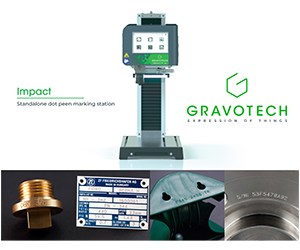



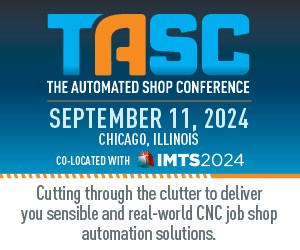
.png;maxWidth=300;quality=90)







